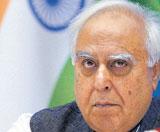
Mumbai, August 4: The government on Friday fixed Rs 14,000 crore as minimum price or base price for the much-awaited auctioning of the 2G spectrum.
“The Cabinet approved the reserve price of Rs 14,000 crore for 5 MHz pan India in 1800 MHz band. The Cabinet also approved the recommendation of Empowered Group of Ministers for reserve price for 800 MHz band at 1.3 times that of 1800 MHz band. This translates into Rs 18,200 crore for pan-India spectrum, “ Union Telecom Minister Kapil Sibal told reporters after the Cabinet meeting.
GSM-based mobile carriers operate in 1800 MHz band airwaves while CDMA-based operators use 800 MHz band. Reacting to the decision, old telecom players said high price would hit the industry hard and said the tariff would go up by Rs 30 paise per minute.
Defending the decision, Sibal said the Cabinet arrived at the decision after considering all aspects including maximum revenue to the government and also protection of the industry.
Now the Department of Telecom will appoint the auctioneer who will start the auction with minimum base price fixed by the government.
The price approved was 22 per cent lower than Rs 18,000 crore, the minimum rate suggested by sector regulator, Trai. It was, however, seven times higher than the price new companies had paid in 2008 to get spectrum when A Raja was telecom minister.
The Cabinet also approved annual fee on spectrum, called spectrum usage charges, at the existing rate which varies between 3 to 8 per cent of revenues earned by companies.
Asked if the government would be able to meet the August 31 deadline mandated by the apex court for auctioning of the spectrum freed from its order cancelling licences of 122 operators, Sibal said the EGoM is likely to meet on Monday.
"Existing slab rate system for Spectrum Usage Charges (SUC), as recommended by EGoM, as the preferred option has also been approved by the Cabinet," he added.
It may be noted that Empowered Group of Ministers had earlier recommended a reserve price at Rs 14,000-15,000 crore for 5 Mhz of airwaves as against around Rs 18,000 crore recommended by Telecom Regulatory Authority of India (TRAI). Though the industry experts expect that with Rs 14,000 crore for pan India licence, the government may rake up over Rs 2.5 lakh crore after completing the auction, Sibal refuse to speculate any thing in this regard.
The apex court while cancelling 122 licences allotted by former telecom minister A Raja, had asked the government to re-auction the spectrum before August 31.
The reserve price may not cheer industry who have been demanding 80 per cent cut in the minimum price suggested by the TRAI. The industry lobby felt that fixing maximum reserve price would trigger increase in mobile tariff while the TRAI dismissed the fear.






Comments
Add new comment